How a Vegan Diet Supports Healthy Skin and Aging Gracefully

Understanding the Basics of a Vegan Diet
A vegan diet excludes all animal products, focusing instead on fruits, vegetables, grains, nuts, and seeds. This plant-based approach is rich in vitamins, minerals, and antioxidants that are essential for skin health. By nourishing your body with these whole foods, you can promote a vibrant complexion and overall well-being.
Let food be thy medicine and medicine be thy food.
One of the core principles of a vegan diet is its emphasis on whole, unprocessed foods. This means you’re likely to consume fewer additives and preservatives, which can negatively impact skin health. Instead of relying on processed snacks and sugary treats, a vegan lifestyle encourages the intake of nutrient-dense foods that keep your skin glowing.
Moreover, many people find that a vegan diet can lead to better hydration levels. Fruits and vegetables with high water content, such as cucumbers and watermelon, help maintain skin moisture. When your skin is well-hydrated, it appears plumper and more youthful, contributing to the graceful aging process.
Antioxidants: The Skin’s Best Friends
Antioxidants play a crucial role in protecting your skin from oxidative stress caused by free radicals. A vegan diet is packed with antioxidant-rich foods, such as berries, leafy greens, and nuts, which combat this damage. By consuming these foods regularly, you can help maintain your skin's elasticity and reduce signs of aging.

For example, vitamin C, which is abundant in many fruits and vegetables, is vital for collagen production. Collagen is a protein that keeps skin firm and supple. By incorporating more oranges, strawberries, and bell peppers into your diet, you’re giving your skin the boost it needs to stay youthful.
Vegan Diet Boosts Skin Health
A vegan diet rich in fruits, vegetables, and whole foods provides essential nutrients that promote glowing skin and overall well-being.
Additionally, foods like walnuts and dark chocolate are high in antioxidants that can protect your skin from sun damage. This protection is essential for preventing premature aging and maintaining an even skin tone. By choosing a vegan lifestyle, you’re naturally increasing your intake of these beneficial nutrients.
Healthy Fats for Radiant Skin
Not all fats are created equal, and a vegan diet can provide healthy fats that are essential for skin health. Foods like avocados, chia seeds, and olives are rich in omega-3 and omega-6 fatty acids. These healthy fats help maintain your skin's lipid barrier, which keeps moisture in and irritants out.
The greatest wealth is health.
For instance, avocados are not only delicious but also packed with vitamins E and C, which protect skin cells from oxidative damage. Incorporating these foods can lead to a softer and more hydrated complexion, making them a staple for anyone looking to age gracefully.
Moreover, consuming nuts and seeds provides additional benefits, such as reducing inflammation. This is particularly important as inflammation can contribute to various skin issues, including acne and premature aging. A diet rich in healthy fats supports overall skin health and promotes a youthful appearance.
Hydration: The Key to Youthful Skin
Staying hydrated is vital for maintaining healthy skin, and a vegan diet often encourages higher water intake. Many fruits and vegetables have high water content, which can help keep your skin plump and reduce the appearance of fine lines. Think of hydration as a natural moisturizer that works from the inside out.
For example, cucumbers and celery are not only refreshing but also have a high water content, making them perfect for hydration. Incorporating these foods into your meals and snacks can significantly improve your skin's appearance and texture. When your skin is hydrated, it reflects light better, giving you that coveted glow.
Antioxidants Fight Skin Aging
Foods high in antioxidants, commonly found in a vegan diet, help protect skin from oxidative stress and maintain its elasticity.
Additionally, drinking plenty of water alongside a vegan diet can enhance your skin's radiance. Aim for at least 8 cups a day, and consider herbal teas as a tasty alternative. Keeping your body hydrated helps flush out toxins and supports overall skin health, making it easier to age gracefully.
Vitamins and Minerals for Skin Rejuvenation
A vegan diet is often abundant in essential vitamins and minerals that support skin health. For instance, vitamin A, found in sweet potatoes and carrots, plays a significant role in skin repair and regeneration. By including a variety of colorful fruits and vegetables in your meals, you’re providing your skin with the nutrients it craves.
Zinc is another important mineral found in legumes, seeds, and whole grains. It helps with skin healing and can reduce the occurrence of acne and other blemishes. By ensuring your diet is rich in these nutrients, you lay the foundation for a clear and youthful complexion.
Furthermore, B vitamins, which are plentiful in leafy greens and whole grains, contribute to healthy skin cell turnover. This means your skin can shed dead cells more effectively, leading to a fresher appearance. A balanced vegan diet can help you achieve the skin rejuvenation you desire.
The Role of Fiber in Skin Health
Fiber is often overlooked but plays a significant role in skin health. A vegan diet is typically high in fiber, which aids in digestion and helps eliminate toxins from the body. When your digestive system is functioning well, it reflects on your skin, helping to prevent breakouts and dullness.
Foods like beans, whole grains, fruits, and vegetables provide ample fiber, promoting a healthy gut microbiome. A healthy gut can lead to reduced inflammation, which is crucial for maintaining clear skin. By focusing on fiber-rich foods, you’re not only improving your digestion but also nurturing your skin.
Hydration Enhances Skin Appearance
Staying hydrated through water-rich fruits and vegetables is vital for plump, youthful skin, reflecting light better and reducing fine lines.
Additionally, fiber helps regulate blood sugar levels, preventing spikes that can lead to skin issues. By stabilizing your blood sugar, you can help reduce the risk of acne and other skin complications. Embracing a vegan lifestyle naturally increases your fiber intake, giving your skin the support it needs.
Lifestyle Choices That Complement a Vegan Diet
While a vegan diet offers numerous benefits for skin health, lifestyle choices also play a crucial role in aging gracefully. Regular exercise, for example, increases blood circulation, delivering essential nutrients to your skin. Pairing a plant-based diet with physical activity can amplify the positive effects on your skin.
Moreover, managing stress is vital for maintaining skin health. High stress levels can lead to breakouts and other skin issues, but practices like yoga or meditation can help alleviate this. A vegan diet can support these activities by providing the nutrients needed for optimal brain function and mood regulation.

Lastly, getting enough sleep is essential. Sleep is when your body repairs itself, including your skin. A healthy vegan diet can promote better sleep patterns, ensuring you wake up with refreshed and rejuvenated skin. Together, these lifestyle choices create a holistic approach to graceful aging.